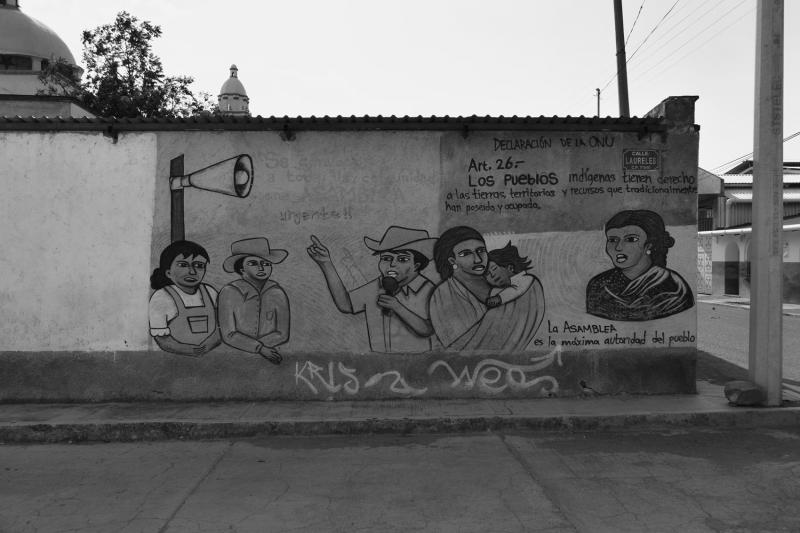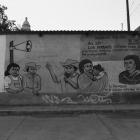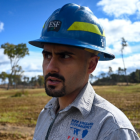When I arrive at the village of Maguey Largo in the state of Oaxaca, Mexico, Graciela Hernández always shares with me her personal reflections on the water crisis in her territory and the political movement of which she is a part. During the summer of 2019, in our first conversation for my ethnographic work, we discussed the defense of, and access to, hydrological resources in the region. She said: “We are achieving a very big victory in the country with this strife, but many do not see that this is not only about water.” As we walked along the paths of Maguey Largo, she continued reflecting: “I see the hills over there, around San José del Progreso, all perforated by mines, and I start to think, what will the ancestors who live on the mountains think about it? They are our caretakers; they are spirits living among us. They give us water, seriously.”
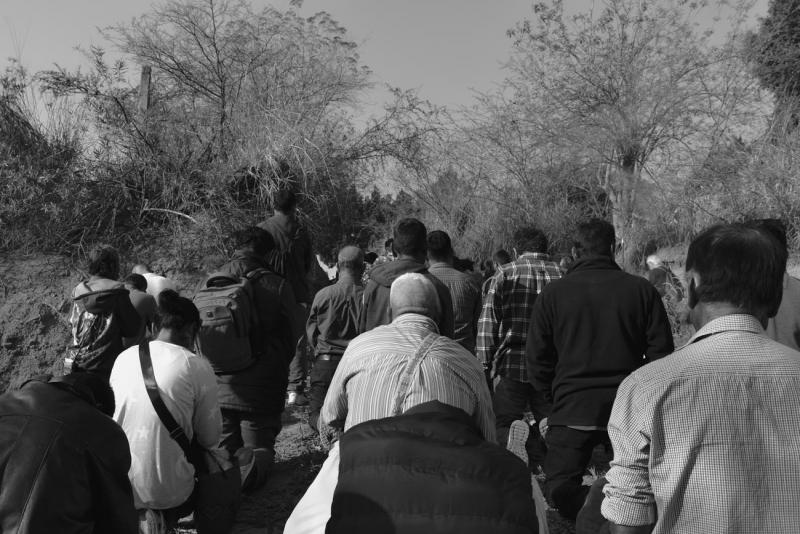
Members of COPUDA, who inhabit Ocotlán Valley, perform a ritual of offerings for the territories, n.d.
Members of COPUDA, who inhabit Ocotlán Valley, perform a ritual of offerings for the territories, n.d.
© Oscar Ulloa Calzada. Used by permission.
The copyright holder reserves, or holds for their own use, all the rights provided by copyright law, such as distribution, performance, and creation of derivative works.
In September 1967, the Mexican president, Gustavo Díaz, issued a decree restricting access to water resources in the Central Valleys of Oaxaca for extractive projects, affecting the hydrological flow in more than one hundred rural towns. Decades of water denial led to changes in the landscape, such as reduced river flow, lagoons being converted into farmland, and notable subsoil humidity impacts. In 2005, a drought strongly affected the life of the local communites and the nonhuman world in the region.
As a result of the limited availability of water and increasing drought, a group of 16 communities in the south of the Central Valleys, in the Ocotlán Valley, began to organize in order to deal with the socio-environmental crisis they were facing. This gave birth to the Coordinadora de Pueblos Unidos por el Cuidado y la Defensa del Agua (Coordinating Committee of Peoples United for the Care and Defense of Water, or COPUDA). With the support of the Centro de Derechos Indígenas Flor y Canto A.C. (Center for Indigenous Rights), COPUDA initiated a dialogue with the Mexican state about repealing the water ban and is also seeking legal recognition of the local knowledge that is used in water management implementation, which is based on what they call “sowing water”—a rainwater catchment method used as a coping method in the face of the long-standing ecological crisis. In addition to this, COPUDA has recently sought to rename its site of action: the aquifer where the Indigenous and peasant communities it represents are living is now called Xnizaa, which means “our water” in the Zapotec language.
Beyond these dialogues with the state and the search for legal agreements, the conversations I had with Graciela and several other people from the valley spoke to a radically differentiated notion of territory. Some native knowledge and practices that can be grouped within cosmological perspectives are a way of negotiating with water in the same way that people negotiate with institutions and the state. In this type of negotiation, nonhuman beings who have specific forms of relationships with the inhabitants of the Ocotlán Valley intervene as agentive actors, making it necessary to delimit this social mobilization as part of a cosmopolitical scheme. Cosmopolitics is a concept coined by the Belgian philosopher Isabelle Stengers. Although it does not have a specific definition, the concept seeks to provide a perspective that approximates and reflects on sets of knowledge in dispute.
For Clara González, a peasant from Santa Ana Zegache, the water crisis has nothing to do with the restrictions imposed by the Mexican state for decades but rather is caused by a lack of commitment to caring for the mountains that are the source of the water. As she alludes: “Here we have María Sánchez Mountain. People do not give offerings such as chocolate, beer, bread, mezcal. The mountain is alone; that is why it does not return water to us neatly. It seems there is no reciprocity anymore.” In this schema, and with reference to Bruno Latour, the cosmopolitical is a reformulation of the classical sociological idea of politics and utilitarian conceptions of reality. When COPUDA engages in dialogue with the state, it does politics, but when the populations make offerings to the landscape and its nonhuman entities, such as spirits or ancestors, they are also carrying out a negotiation to gain access to water.
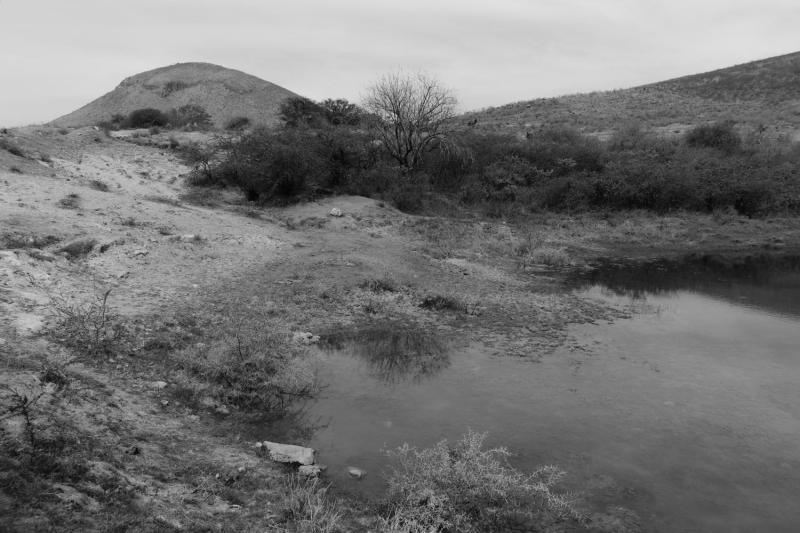
María Sánchez Mountain, a nonhuman agent of the territoriality of the Ocotlán Valley, n.d.
María Sánchez Mountain, a nonhuman agent of the territoriality of the Ocotlán Valley, n.d.
© Oscar Ulloa Calzada. Used by permission.
The copyright holder reserves, or holds for their own use, all the rights provided by copyright law, such as distribution, performance, and creation of derivative works.
In November 2021, the Mexican state repealed the 1967 water ban after 15 years of social struggle. Subsequently, in August 2022, the federal government issued water concessions to Indigenous communities, legally recognizing their water-management practices in the towns of the Ocotlán Valley. These communities rely on the Xnizaa aquifer and are now officially authorized to manage their water resources using their own knowledge and technologies, including their differentiated territorial perspectives.
In the 56 years since the decree, the communities that inhabit the Ocotlán Valley have learned how to the confront ecological crisis and the modern rationality underpinning it, which threaten the presence of nonhuman entities through the power of capital and extractive policies. In the case of COPUDA, the defense of water and its cosmopolitical condition opens multifarious paths for dialogue, mediation, and other possible imaginaries of the future. It is an important example of the creation of environmental alternatives and political organization for the self-management of water in Mexico that takes into account the qualities of radically differentiated knowledge that converge in the Xnizaa aquifer.
How to cite
Ulloa Calzada, Oscar. “Cosmopolitics in the Territories of Xnizaa: The Defense of Water in the Central Valleys of Oaxaca, Mexico.” Environment & Society Portal, Arcadia (Summer 2023), no. 10. Rachel Carson Center for Environment and Society. doi:10.5282/rcc/9615.
ISSN 2199-3408
Environment & Society Portal, Arcadia
 This work is licensed under a Creative Commons Attribution 4.0 International License.
This work is licensed under a Creative Commons Attribution 4.0 International License.
2023 Oscar Ulloa Calzada
This refers only to the text and does not include any image rights.
Please click on an image to view its individual rights status.
- De la Cadena, Marisol, and Mario Blaser. A World of Many Worlds. Durham, NC: Duke University Press, 2018.
- Latour, Bruno. “Whose Cosmos? Which Cosmopolitics? A Commentary on Ulrich Beck’s Peace Proposal.” Common Knowledge 10, no. 3 (2004): 450–62.
- Questa, Alessandro. “Broken Pillars of the Sky: Masewal Actions and Reflections on Modernity, Spirits, and a Damaged World.” In Indigenous Perceptions of the End of the World. Creating a Cosmopolitics of Change, edited by Rosalyn Bold, 29–50. Cham: Palgrave Macmillan, 2019.
- Schwartz, Diana. “Transforming the Tropics: Development, Displacement, and Anthropology in the Papaloapan, Mexico, 1940s–1970s.” PhD diss., University of Chicago, 2016. Open Access Repository for Documents, Data, and Media, University of Chicago. https://knowledge.uchicago.edu/record/1730.
- Stengers, Isabelle. Cosmopolitics I. Minneapolis: University of Minnesota Press, 2010.
- Stengers, Isabelle. “La propuesta cosmopolítica.” Pléyade 14 (2014): 17–41.


